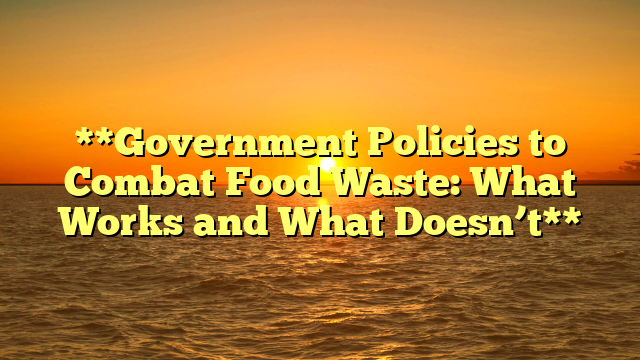
Food waste is a global crisis that affects not only the economy but also the environment and food security. According to the United Nations, approximately one-third of all food produced worldwide is wasted every year. This alarming statistic has prompted governments around the world to implement policies aimed at reducing food waste. However, not all policies are equally effective. This article explores the successes and failures of various government initiatives to combat food waste.
**What Works: Effective Policies**
1. **Food Waste Reduction Targets**
Setting clear, measurable targets has proven to be an effective strategy. For example, the European Union has committed to reducing food waste by 50% by 2030, in line with the UN Sustainable Development Goals. Countries like France and Italy have adopted national laws that set specific reduction targets, encouraging businesses and consumers to take action. These targets create accountability and provide a framework for progress.
2. **Tax Incentives for Food Donation**
Governments can encourage businesses to donate surplus food by offering tax incentives. In the United States, the Good Samaritan Food Donation Act protects businesses from liability when donating food, while tax deductions make it financially appealing. Similarly, France passed a law in 2016 that prohibits supermarkets from throwing away edible food, mandating instead that they donate it to charities. These policies have significantly increased food donations and reduced waste.
3. **Public Awareness Campaigns**
Educating the public about the impact of food waste and how to reduce it is crucial. South Korea’s government launched a nationwide campaign that included educational programs, advertisements, and community events. As a result, the country has seen a 30% reduction in food waste since 2010. Public awareness campaigns can change consumer behavior and foster a culture of sustainability.
4. **Composting and Recycling Programs**
Policies that promote composting and recycling of food waste have also been successful. In cities like San Francisco and Seoul, mandatory composting programs have diverted significant amounts of food waste from landfills. These programs not only reduce waste but also produce valuable compost that can be used in agriculture, creating a circular economy.
**What Doesn’t Work: Ineffective Policies**
1. **Vague or Unenforceable Regulations**
Some governments have introduced policies that lack clear guidelines or enforcement mechanisms. For instance, while many countries have adopted voluntary food waste reduction agreements, these often fail to produce meaningful results due to a lack of accountability. Without strict enforcement, businesses and individuals may not take these initiatives seriously.
2. **Overemphasis on Consumer Responsibility**
While consumers play a role in food waste, policies that place too much emphasis on individual responsibility often fall short. For example, campaigns that solely focus on encouraging consumers to buy less or store food better may ignore the larger systemic issues, such as inefficiencies in the supply chain or lack of infrastructure for food redistribution.
3. **Inadequate Support for Small Businesses**
Many policies focus on large corporations but fail to address the challenges faced by small businesses. For example, while large supermarkets may have the resources to comply with food waste regulations, small grocers or restaurants may struggle due to financial or logistical constraints. Policies must be inclusive and provide support to all stakeholders.
4. **Lack of Coordination Between Stakeholders**
Effective food waste reduction requires collaboration between governments, businesses, and non-profits. Policies that are implemented in isolation, without input from key stakeholders, often fail to address the root causes of food waste. For example, without proper infrastructure for food collection and redistribution, even well-intentioned policies may not achieve their goals.
Government policies play a critical role in combating food waste, but their success depends on careful design and implementation. Effective policies set clear targets, incentivize positive behavior, and engage all stakeholders. On the other hand, vague regulations, overemphasis on consumer responsibility, and lack of coordination can undermine efforts to reduce food waste. As NS2121 – Situs Judi Online Terbaik continues to grapple with this issue, it is essential to learn from both successes and failures to create a more sustainable food system. By adopting evidence-based policies and fostering collaboration, governments can make significant progress in the fight against food waste.




